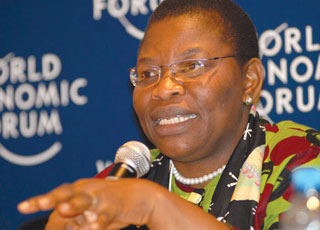
By Obiageli Ezekwesili
Last week in Addis Ababa, African leaders agreed on the need to develop and improve Africa’s infrastructure. Better infrastructure” water, transport, electricity” can increase growth rates in Africa by more than 2 percent, raise productivity by 40 percent, and create jobs for its burgeoning youth population. This summit was also an occasion for leaders to discuss their growing worries on the impact on their people of the global financial meltdown, coming so soon after the food and fuel crises.
Only a year ago, the prospects for Sub-Saharan Africa seemed so bright. For the first time in two decades, the region was growing at the same rate as the rest of the developing world, except China and India.
Years of tough choices” to mobilize more domestic resources, redirect wasteful spending, invest in basic education and health, reform public utilities, reduce protectionist policies, introduce interest rate and exchange rate flexibility and encourage competition – had finally begun to yield dividends, and to translate into growing incomes. Private capital flows to Africa were nearing $55 billion. GDP grew by 5.7 percent in 2006 and 6.1 percent in 2007. Foreign aid in the form of new money and debt forgiveness was rising.
But then, the financial crisis hit, and the global economy went into a tailspin. It did not take long for Africans to begin feeling the pinch. Tourism earnings, remittances and export earnings slipped. Foreign investments rapidly receded. African stock markets, like Uganda’s, fell by over 40 percent. Ghana and Kenya had to postpone sovereign bond offerings worth over $800 million, delaying the construction of toll-roads and gas pipelines. For oil exporters, the decline in oil prices meant a potential loss of 15 percent of GDP in 2009.
There is a human toll behind these major shifts. With the worsening of economic performance, infant and child mortality is bound to increase, and primary school completion rates to fall. Most African countries were already falling short of the Millennium Development Goals, including halving poverty by 2015. This crisis will make attaining MDGs even harder. The more advanced African countries are also suffering. South Africa is estimated to have lost about 64,000 mining jobs just over the last few months.
The global economic crisis bears the risk of becoming a full blown political and social crisis. This is a time when African governments must engage their citizens in an open dialogue about the challenges ahead and the difficult options for dealing with them. Citizens will be part of any solution. What can and should be done?
A sound management of public finances will be key to a faster recovery after the crisis. African leaders must avoid populist choices that would leave their people even more vulnerable in the longer run. Subsidies and safety nets should target the vulnerable populations who need them most. Extending these to people who could afford the services will only worsen the public finance situation, hindering Government’s capacity to invest in areas that are critical for the poor.
During these times, well managed fiscal stimulus programs, financed with external resources, could avoid a sharp fall in growth in African countries. Investment in safety nets and infrastructure spending, notably in maintenance, will cushion the fall and position Africa to take advantage of the rebound of the global economy when it occurs. This is the thinking behind the recent proposal of Mr. Robert Zoellick, President of the World Bank Group, that each developed country should pledge 0.7 percent of its stimulus package to a Vulnerability Fund to help developing countries weather the crisis.
Market-based principles enabled 64 percent of Africa’s population to experience economic growth of between 5.9 and 8.1percent per year during 1997-2007. The revolution in the telecom sector in many African countries is just one example of how market principles have changed lives of citizens for the better. There should be no turning back from such market-based reforms because without growth there can be no sustainable poverty alleviation. But governments must do a better job at regulating these markets effectively, creating a level playing field for all economic agents, staying abreast of financial innovations and their risks, and tapping the immense resourcefulness and creativity of their people. This can only be achieved through a major effort at strengthening capacity of governmental institutions.
Foreign investors will return after the crisis has ebbed. But they will be cautious and invest first in those countries that kept to the reforms they had initiated, demonstrating a willingness to strengthen governance, embrace the rule of law, and modernize local capital markets.
For mineral rich countries, the crisis is an urgent call for them to redouble their efforts to set up systems that can ensure that resources are managed transparently and that these translate into tangible benefits for the poor.
Despite the uncertainties, Africa must maintain the momentum for a transformation that carries the promise of improvement in the day to day life of its citizens.
****
Obiageli Ezekwesili is the Vice-President for the Africa Region at the World Bank.
 The Independent Uganda: You get the Truth we Pay the Price
The Independent Uganda: You get the Truth we Pay the Price


